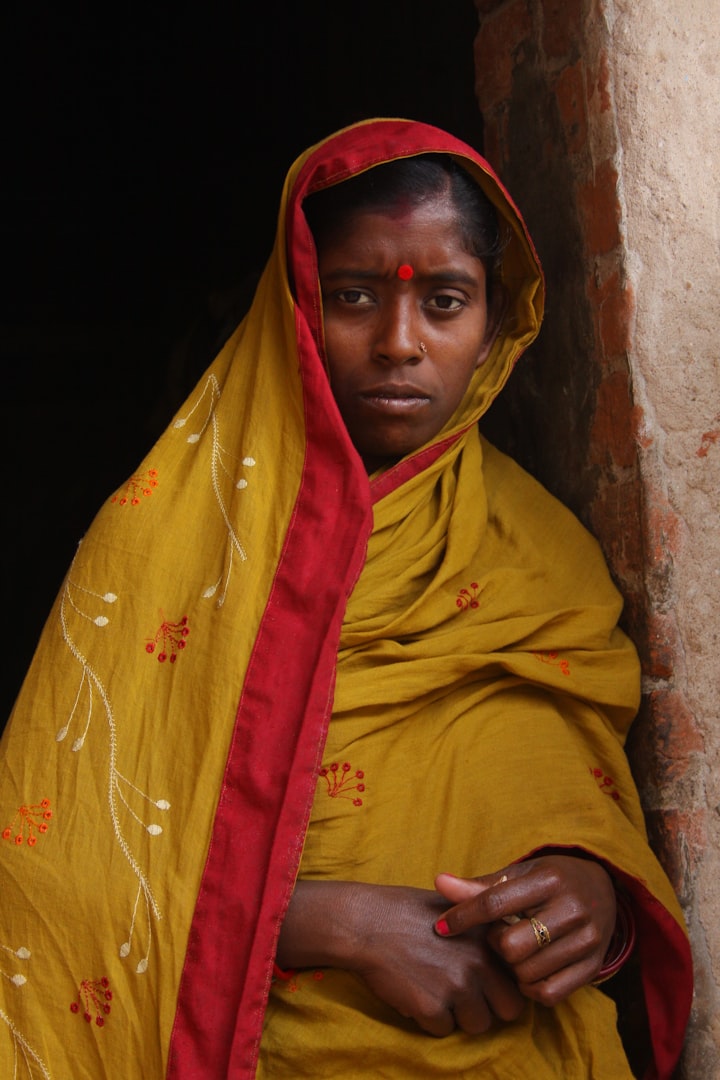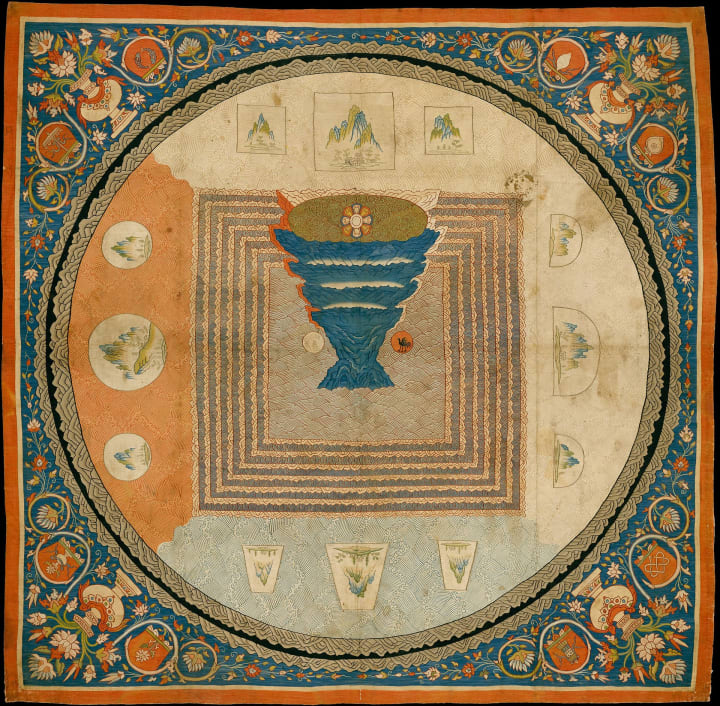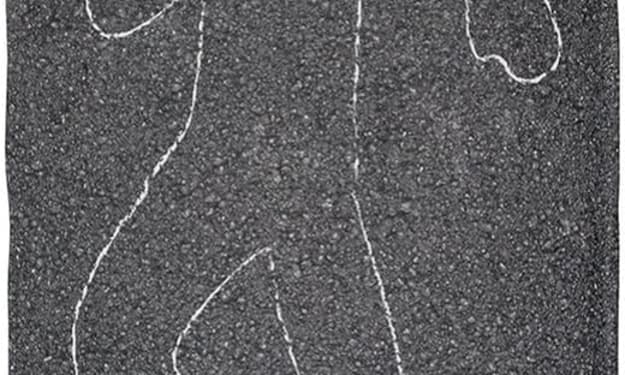Seeing is Believing
Prologue to Against the Unbroken Yew— the envoy Asita’s first encounter with the surviving Kaurava kingdom and the river, Valley, and village all bearing the name Ganga

There weren’t always dragons in the Valley.
Tribes of Asura soared through gale winds, communicating and seeing in ways more bee or mycelium-like than human. They hadn’t always enjoyed such freedom.
Before their relegation and long awaited release, fate and time dictated their follies. Back then, their decision to let life in the Valley flourish undisturbed for so many millennia had been half kindness and half the morbid curiosity of observing a pet colony.
That was their fatal mistake.
Eighty years before the birth of the Buddha—
The earth squelched beneath Asita’s feet, threatening to pull his chappals off with every step. The seven year old recalled the last words his mother said to him before his hundred mile pilgrimage. With tears in her eyes she had knelt in Indraprastha’s statued, marbled halls to fasten a protective talisman to his lapel and tassels, forming concentric sigils out of woven gold: “Asita, don’t worry. This is your dharma, your duty. You’ll fall in love with King Narad and his people. His daughter is so bright and prudent. You could learn a thing or two from her.”
The magic hadn’t done much to deter highway robbery.
One sandal popped free of his foot as if from the vacuum suction of an octopus. Cephalopods. Bilaterally symmetrical mollusks characterized by prominent heads and tentacles. He squatted to extract his shoe from the mud, pulling until it made a violent “slorp” sound and knocked him on his rear. Cephalopods, he quizzed himself, stoking a bitter fire inside.
Laid on his back with chappal in hand, Asita stared at the sky. It stank of blister sweat and metallic heat steaming mist into summer air. Clouds passed overhead for the better part of an hour, and he imagined they drifted over Ganga to drown the King in monsoon rains.
Asita noticed the shaligram inches from his face. The glittering green stone contained outside imprints like a lotus atop a gada, or mace, and a white line as pure as the string of a wedding garland. As if sent by the river, the spiral fossil, appearing on the stone's concave side like a ram’s horn coiled into a perfect circle, settled his stomachache.
He held it, just to own something again.
Asita picked himself up like a marionette doll and trudged forward. Sutradhara. String-puller. Puppet-player. Sutradhara. Thus his thoughts, as they so often did these days, led back to his father.
Dragons. Asuras. His inner fire grew.
“The best way to keep something hidden is in plain sight,” his father had said as they strolled through towering shelves of cobwebbed tomes. Asita had run his fingers along the books’ gilded spines, savoring the fingertip sensation of priceless stories just pages away.
He continued walking, but one particular memory burned like a shard of molten glass digging into his heel. Asita followed the riverbank, squinting to watch his footing, and he felt a stone in his throat remembering the hour he had spent screaming for help just two days ago, clinging to a root hanging out above the rapids.
When they had found him, he wasn’t given time to be thankful. Eyes carved with scar tissue, the twin pair of thieves first snapped Asita’s purse off his belt. Gold coins scattered to the jungle floor, and the thieves fell upon themselves, scrambling to collect the lion’s share. After arguing, they took his talisman. His mother’s work— gone. The pair ransacked his pack until they found both the crystalline orbs his sister prepared and his father’s time-keeper.
Asita kicked and screamed as they pinned him down, snapping his glasses and drawing knives of etched bone. “We’re sorry,” they said, yanking his hair out of its topknot and cutting it down to the scalp. They had walked away without taking another word, holding the hair tight in a fist like the tail of a poor, mistreated horse.
Asita touched his swollen cheek, wincing at the light pressure. The bridge of his nose wore a splotchy, purple mark, bright against his dark almond color. For the past forty-eight hours he had wandered the forest as a blind man, unable to see past four paces. He’d tried to convince his eyes to relax, but nights left their socket skin taut and sunken. Chirping cicadas and hooting owls swam among seas of mosquitos and crawling things with uncountable legs. Every blurred light became another pair of eyes searching for prey.
Everything his father taught him felt useless without sight. His split lip throbbed, but canteen water failed to help, and his head itched like he’d laid in a nest of fire ants. Finding medicinal plants for salves proved impossible without sticking his face in every nettled bush.
Like with most things they said, he'd had no clue what his father’s parting words meant beyond their surface meaning: “At your age? You made one already? Huh, Ugo? Take good care of him kanne.” Even his twin sister didn’t understand: “Dad is a strange one. They may be centuries old, but they act like they woke up yesterday.” Years of memory melted into a moment like the last sands of an hourglass. One hundred storybooks beckoned Asita home, but none held the secrets he and his father searched for.
“Father, what is our family name?”
Adhikari, child of the original dryad, gave no empty promises to their son: “How could I know? My connection to the roots of our homeland severed long ago. I never expected that sight, so I evaded disappointment.”
Yet Asita saw the lifetime of pain behind his father’s eyes. “Come,” Asita said, “Let’s search.”
Adhikari dropped their sheepish, evading smile.
“Once you take up this mantle, you may never cease action.” Many voices inside his father whispered together—
“Tread softly, child.”
The shape of the sky in those moments resembled the mountaintop Adhikari called their ancestral home— the facsimile they cherished beyond just a place of meditation.
Adhikari continued, “We search for the ones who holds our Hearts, every memory and experience of our people, however painful. That individual may reshape all our folk as they will.”
“Teach me.”
Father and son curled up in an alcove of Indraprastha’s greatest library, and the vision and cold of snowy peaks dissolved back into the familiar, warm light of a well used oil-lamp.
“Ganga is an empire of contradictions. Tradition dictates when the shadows of your star lengthen into long twilight, you will follow in your mother’s footsteps, yet walk an altogether new path. The only truth you will find there is one of your own making.”
“Why must I go, Father?”
In those first days of mystery, Asita climbed cathedrals made from memory with the hooves of a satyr and swam as a dolphin through sunken cities imagined by a single piece of coral. All of these, Adhikari built; their mind seemed a cradle of dense strings, pulling and catching history’s every experience in a netted sieve.
“The truth arcs back to the very days when dragons roamed free. Spirit meant something then, if you could keep it. Asita,” they said, “Stories lie everywhere, but the truth of the dragons’ fate can’t hide forever. In the Valley, you may find secrets I could never reach.”
Asita contemplated this but still needed to ask, “Father, what became of the Asura? What were they like? The days dragons roamed free?”
“They lost their Hearts.”
Asita went white. “They died?”
“No, my child. The Asura undergo many cycles of reincarnation. In this, their Hearts remain and house the seeds of their karma. Stories, passed down through the same oral tradition I share with you, tell of skies filled with beating red Hearts, bearing down on defenseless lands.”
“But the Asura weren’t all evil, right?
“Let me show you.” Adhikari reached out and, after an affirmative nod, pressed their thumb and index to Asita’s forehead.
A vision of machinery harvested the Heart of a humanoid man, covered in scales and spiny ridges. A beast of steam and brass leaves actuated his lungs and forced his Heart to incarnate outside his body, unable to kickstart his soul through fire. The man dropped lifeless to the floor. The machine beat on, a red, crystal Heart pulsing in its innermost nadi, its central channel behind walls of pipes.
“The world took advantage of the Asura, but blood stained their hands too.” The vision shifted to one of a women, an Asuri, playing a flute to fields of dryads. They wore eerily tranquil, trancelike expressions, leaning out of their trees and plant-homes as they did while gifting favors to mortals. Here, the Asuri opened the dryads’ chests with sweet music and empty promises, infecting Asita’s people with surrogate Hearts. Entering between ribs, the Hearts calcified, telescoping organs and fascia in on themselves. The dryad bodies petrified slowly, then all at once, crackling into nothing but empty shells for the Asura to hide their own failings within.
Asita looked on with horror and revulsion. Is this what his people had to bear? What his father had run from all those centuries ago?
“An insurance policy. They feared for their lives. Asuras had died in the thousands, an unprecedented loss. Their very souls were taken from them and made inert. It’s no wonder they sought to preserve their immortality, sheltering their Hearts until curses won the war for them— fighting while their fallen would be revived behind front lines.”
He saw, for the first time in his life, tears pouring down his father’s face. “We were of the same hearth and home. Of the same kind. It meant nothing to them. Nothing.”
Adhikari built one last image on top of their alcove, returning to their mountaintop home and a single pine tree. Asita witnessed the steady glow of several Hearts within his father’s tree, beating in time with the water of the wood.
Adhikari spared a smile of rue and regret for their son. “Our people have the blessing and the curse of housing many spirits within.”
Asita held his father tight as they looked above to a small circle of stars, the only ones visible through the caldera opening that lead to Indraprastha’s nestled caverns. Though they hadn’t realized, father and son shared a thought: If only I could stay.
Asita could guess how peacock feathers and kolum powder decorated every entryway of Ganga, differing from history only in grandeur. Though he had claimed his journey would waste precious time, surface knowledge of these simple traditions remained as incisive as seeing light from a mirror and calling it the reflected thing.
So we begin with his blank slate, as all efficacious stories must, because it lives uncarved at the intersections of so many: the consequences of Princess Buddhi and Prince Indriya’s failed betrothal, of Adhikari’s centuries late reawakening, of crystal yew trees bearing names of silver light, and of the cruel twists of fate that allowed Jahangir to swallow the moons and sun.
What kind of ruler will Narad be? How will some country girl grow into a dependable Queen? Why is it my responsibility to find out? Fizzling into sullen pebble-kicking, questions first sped then collided in the turbulent sky of Asita’s thoughts. No answers arose. The envoy’s thoughts roared with the inescapable river. I should be searching with Father. Why is it so important that these people, out in this middle-of-nowhere forest, come visit the kingdom of Indraprastha?
The end of the road gave way to a sprawling village composed of packed clay and silted wooden structures. Bounded by walls of shaved trees touching trunk to trunk, welded together scrap metal formed an irregular gate. Seared deep into the iron, an inscription read in script and braille:
நான் பார்த்ததை யாராலும் பார்க்க முடியாது
Nāṉ pārthathai yārālum pārkka mudiyāthu
No one can see what I have seen. As this translation came to mind, Asita made the unfortunate mistake of walking without knowing where he would go.
“Watch out!”
Asita saw the blurry shape hurtling towards him in time to dive backward into the pile of mud and fresh cow dung waiting to break his fall. The blur called out, “Ay, loosu, get out the damn way!”
Asita groaned and, failing to hold it in any longer, began to cry.
The cow, who had left the steaming dung as her way of saving and welcoming the young boy, looked balefully at the snotty, stinking shape. She thought, “How unfortunate it must be to not have any food or water left out for you by kind passerby.”
Asita sat numb in the shade of the adobe buildings through the noon sun’s pass into twilight. Crowds of henna’d women, armed soldiers, and bejeweled merchants jangled by without pause. Two men in rags, with tearstreaked faces and mummified expressions, held out empty bowls in mute resignation. A man squatted to the grass, nursing a cigarette he couldn’t afford. No one paid them any mind. In a street show proclaimed as “Spinal Art”, blue Krishna’s touch made the clearest bell’s ringing, as if from a golden singing bowl humming the properties of energy’s every manner. Even they seemed too busy for the child.
Is this kingdom irredeemable? A lost cause not worth saving?
Beside the cow, an ashen man finished singing devotional songs and picked up a flute carved with an image of Rama stringing and breaking the Shiv Dhanush, the bow wagered against Goddess Sita’s hand in marriage. “Jai Shri Ram,” he called and played, drawing an unseen cobra from its woven basket.
The snake stared at the mute boy with its slitted eyes. Shocks of crimson shot through its cobalt blue scales, and in the sunlight it could be mistaken for a platinum mirage. Behind Asita’s eyes, a being reached out and said hello. The cobra, no longer landlocked, hypnotized him in a sea only it saw, moving along invisible, universal currents.
Asita withdrew into himself. The familiar library grew in his mind, and the little person behind his eyes, a golem or homunculus maybe, shook itself free from seas of moss clippings.
“Who are you?” Asita asked himself.
“I’m Asita, as much as I’m not. Your father named me Ugo, as much as it had already been my name.” The creature spoke with a faerie’s lilt and matter-of-factness that left Asita rubbing his temples.
“Are there more of you?”
The thing split in two— with Asita unsure of who's volition it did so by— and laughed in its elvish way, like bells on a summer day. Mayflies and a wooden raft floating down a gentle brook. “Not as far I know,” the pair spoke in harmonic unison. The trio walked through moss down the halls of Asita’s mind. This library lacked the cavern ceilings of his home and instead opened up to a sea of infinite, tranquil blue. Every time he looked to the cerulean sky, he could not see the sun, for the walls of bookshelves stretched ever higher.
An adjacent translation for the Ganga’s gate script arose within Ugo during the long hours Asita remained in his mind: “Who all refuse to see what I have perceived?" Asita smiled like his father at Ugo's helplessness, seeing its Nameplace brought so low, so he let the homunculi guide him to all his favorite memories— playing as scorpions burrowing through sand dunes to the treasure chambers of inverted pyramids; as through the vision of a hawk connected to a familiar child by a translucent string of mind.
Ugo beckoned Asita further and further through the palatial corridors. The smell of burning paper and leather swam up to the boy, pushing against him in great gusts of steam. The bellows, with the airflow of a forge, twisted the space’s pull until the floor acted like the walls of a tunnel trying to reach Earth’s center.
At the base of this hole, Asita leaned into the gravity pulling him towards a pyre of burning books. Charcoal moths flitted out of scorched pages and rested in a surrounding nest of wood, shaped like the palm of a gentle hand. Jagged shards of oak and pine splintered into perches and grew with the blaze of fire, as if it quenched a thirst for air and sun.
Dozens of books fell from the shelves, filled with pages of dragons. An upside down body. A mountain of five toes, with a head crested by a thousand-petaled lotus stretching to the sun. Spiraling down through the body in the form of a trickster serpent, a sapphire river yawned. On several pages he caught mountains of four peaks wearing cardinal faces of gold, crystal, lapis lazuli, and ruby.

At the same moment Asita looked beyond the burning books and caught sight of a pulsating, nascent glow of crystal within flame, a young lady arrived to help his physical body. She decorated herself in a beautiful vermillion sari embroidered with hand-stitched silver petals. Her left hand steadied a full earthen pot of water atop her head, while she reached down with her right to offer him a burnished plate of fruits atop a tattered dish rag.
“Goddess Lakshmi?” Asita asked as he wiped his old tears.
“No, but you can call me Tāmarai. Come, let’s get you bandaged up.
He looked past her and saw the snake charmer and his basket were gone.
“How despicable that no one came to your aid. Trust demands sight, not blindness. For in sight, knowledge follows, and knowledge forces the hand. Beware our folk who revel in empty promises. King Narad would be ashamed to see how his people have treated you in willful ignorance.”
Asita sniffled and followed Tāmarai down a winding dirt corridor of heartbeats and their homes. Like at home, the cows were taken care of. Passerby offered prayers and prasadam to the lumbering animals. As the sun bore down, smells of jasmine, camphor oil, and sandalwood streamed by Asita, and he caught the glint of precious gems grown into the trunks of shady, vined trees.
At a brown door, solid as if it remained attached to the tree it was separated from, Tāmarai knocked and smiled— he could see the glint of her cloved grin even in his blurred reality— at the wide, dark shape in front of her. “Mātula, can you please take this steaming cow pile out back to wash? Wait, I never asked your name.”
“Asita,” he said. At this Mātula smiled, with depth and fire.
“Excellent. Just the student I’ve been waiting for. Come, come in,” Mātula said, echoing down to Asita's bones.
After the door shut, Tāmarai leaned against the worn brick wall, smelling like dust and fear sweat. They stilled their frantic heartbeat and turned the ring on their finger, shifting their face and vocal cords along with gemstones and metal. If Asita had seen, he would never have trusted his parents again. They draped their salwar over their head and relished the light breeze flowing around their neck. One chance to rest. Chill against their forehead, the sandalwood under their bindi stilled the burning between their eyes but did not spare them from sight. A vision only they saw burned with skies aflame, the river Ganga twining into the sky like a serpent’s maw, and worst of all, the curse of misbegotten power. They shamed themselves for their lack of courage, for their eternal life as a bystander. By prayer and providence, may Asita remain blind to the truth.
The man who smelled like peppermint, sage, and thyme unlatched a side gate to an outdoor workshop filled with three bubbling cauldrons. He snatched the emerald fossil from Asita’s belt without notice and chanted while pouring several gallons of ice-cold water over the stone and the boy.
Gayatri Lakshmi Mantra. Asita almost wept anew, recognizing his grandmother’s favorite prayer, though in an unfamiliar tongue.
After some time drying, the envoy murmured something.
“What? I’m a medicine man, not a bat. Speak up, I can’t hear you.”
“Do you have any food?” the boy mumbled, dwarfed by his terrycloth towel.
“Well I suppose we should bring out the fourth pot then.” He went into his adobe hut and left Asita to sleep.
***
Asita woke, groggy and no longer alone. He started at the heat of a cook-fire and the appearance of a speaking figure lying down on Mātula’s workbed.
Mātula tended to the fragrant pot of thick stew above the flame, adding spices and stirring. “You think you can never have too much turmeric, but then you get to two handfuls and it’s almost impossible to get the taste out of your mouth,” Mātula said as the girl laughed.
“Maybe more pachai milagai might help?”
“Good flavor profile, I like the way you think, Chef.”
She giggled. “As long as you save me a whole jar of mango oorugai.”
“Mātula, how long did I sleep?” Asita wiped his drool and sat up.
Mātula flicked his ladle at the girl. “Long enough for this fool to go and shoot themselves in the knee with a Marking arrow.”
She swatted back at the old apothecary. “I didn’t know, stop reminding me!”
“You didn’t understand, or see. Speaking of seeing, I have something for you, Asita.”
Mātula molded a copper wire around the bridge of Asita’s nose. Before Asita’s eyes, the wizard rubbed his hands together fast enough to glow before whipping Asita’s broken glasses out of an apron pocket and pressing the molten pieces together.
“How did you do that?” Asita said in awe, as Mātula handed him the mended eyepiece.
Mātula hissed and blew at the sparks still stuck to his hand. “Practice, mostly. A clear mind, good food. A fair dose of magic. Underneath all that, probably the breath. You can learn too if you’d like to try. But before that, come sit. This goat curry won’t eat itself.”
Mātula leaned in and whispered, “Ugo, is it? You’ve got a good friend in you. Take care of him.”
Asita stared at Mātula, dumbfounded. Was he a dryad too? Ugo shrank away, deeper into the library, not quite trusting the fresh pair of eyes peering in and seeing themselves out. “How do you know?”
“I make a habit of learning true names. They stick to me,” Mātula said as the three companions sat cross-legged on bamboo mats and began shoveling curry in their mouths with buttery naan.
“Asita, what brings you to the village of the Kauravas?” the girl asked through a mouthful of mutton.
“I’m here to invite Princess Buddhi and King Narad to Indraprastha. I need to reach the castle eventually,” Asita said, “but I would like to stay the night here if possible. I wouldn’t like to make a poor impression.”
“Oh, I think I would love to go,” Buddhi said, beaming, “Thank you for your kind invitation. I’m truly very sorry for your difficulties in travel.”
Asita’s mouth dropped like a pitcher plant. “You’re Princess Buddhi?” The girl he saw before him couldn’t be further from his mother’s description: smeared with dirt and blood, unable to focus on anything for more than thirty seconds at a time, and worst of all, smelling like they’d rolled in cow pies before dinner. Though he wasn’t one to talk.
“Thanks for dunking me in the tank, Mātula,” Princess Buddhi said.
“It’s the least I could do for my poor nose.”
With his glasses fixed, Asita could finally see his saviors and the city he found himself in. Visible from the workyard, a wooden seaship peered out the side of the Kaurava’s stone castle. The twin moons, one a waning crescent and the larger waxing into its fullest state, shined on the strange pair.
Mātula bore thin scars in overlapping lattices all across his face and body. He wore his hair in thick locks that streamed down his face, giving it the appearance of a hooded umbrella mushroom.
Buddhi shined with dark, tanned skin and bright eyes. She looked the same age as Asita, but her face already glowed with painted sun smiles and excessive laughter. Asita fought the urge to point out that her bindi had practically fallen onto her eyebrow. Though he needed no convincing to hold his tongue when he noticed the stained bandage swaddling her knee.
“Ai, fix your bindi, child. Your father will be here soon,” Mātula scolded.
She did and Mātula waved them down onto the reed mats in half-lotus posture. “The sensations shape the body, which shapes sensation. Breathe with me. Follow this pranayam. As one comes, the other goes. Holding the air.”
So they followed.
The world opened again. Like the fat shell of a ruby pomegranate, experience itself cracked open and, although they didn’t know it, bowed before the two rudders of fate taking their first steps into Brahman.
After a scarce half hour, Asita released his breath and opened his eyes to find that the geometries of his mind followed him into waking. Reality warped and bulged in a space made of mirrored sky, reaching out past vertiginous cliffs of glass. The two woke to find themselves on this cratered translucence. In their minds, they felt the salt and gust of a sea breeze. In a moment of vicious clarity, Asita and Buddhi clasped hands and jumped.
Down an infinite sheet of glass, they fell.
The dragons revealed themselves then— what was left of them. Hundreds of humanoid forms bearing extra arms and heads stood on the cliff face. Three stared as the pair rocketed by while the others wandered with blank expressions. Asita saw their faces flash with disappointment: "You are not who we expected."
While Buddhi still fell, they moved hundreds of feet in a blink and caught Asita’s hand. The mirror dimension collapsed into the familiar library, but the three beings gave no indication of surprise. They stood among the shelves as Ugo bowed. They nodded in acknowledgement, but made no motion for him to rise. “Retrieve our Hearts.”
“Why should I help you?”
The Asura rested in his nest of oak and fire. The oldest Asuri, an ancient woman, reached for a book and floated it up to Asita. Atop the familiar four mountain peaks, hundreds of figures sat in meditation, their faces obscured by the many-colored lights emanating from behind them.

“We offer nothing but peace.”
The image of the library shattered, and Asita’s lips and skin flapped in freefall, though his physical body remained still and tranquil. Racing to a sparkling ocean, the water burst as he collided without pain. His inner fire burned until it burst the triumvirate dams of emotion, knowledge, and sight. Geysers of steam erupted in that place of mirrors where the two children stayed suspended, weightless, as part of the sea.
Buddhi wept, for she saw the true nature of her injury. Warped time wrapped her knee. Red bolts of lightning, fog, and magma boiled under the surface. Most of all, though, she choked on the weight of guilty thorns twining their way up her leg.
Asita saw this energy, and he understood the commensurate nature of Marking— its cruel fairness. Maybe this kingdom isn’t doomed after all. Maybe I ought to hope. He realized how the curse of Marking would afflict the thieves who wronged him. In his mind’s eye, Asita saw them drawn by magnetism to a universe where they too lacked sight. Their eyes blurred over, no matter what sacred rites they performed to absolve their crimes. They became incapable of holding gold. It slipped through their fingers and purses like the sands of an hourglass, reducing them to begging for alms on the streets of Ganga.
Much later, when the silver moons rose high, Mātula spoke. “What you see now is the sukshma sarira, the ocean of lights made home in body. You will remain blind to whatever you cannot bear to see, for it is the flow of energy through all things. It is the comprehension of nature.”
A heavy knock came at the door, interrupting their meditation. Asita watched Buddhi strain and limp to greet her father first, so he waited, eating his curry and admiring Mātula's humble library. Just like home.
“Come. Blood is time.”
The voice rumbled like a drum, wider than a ravine. Asita stepped into the shadow of the doorway, shaking by some genetic instinct at the spit-roasting sound. It boiled his skin, pulling it in by gravity and dry heat.
At the start of the year, a month after Asita began his endeavor to find the truth of his people’s fate, Adhikari asked, “What made you decide?”
Looking out to the alcove’s sliver of stars, Asita said, “I would rather risk blindness by understanding than death in the darkness."
He didn’t realize then how little difference there was between the suffering of war’s victims.
Asita’s empty bowl crashed to the floor. A man with uncountable dancers trapped beneath his writhing skin stepped out of the darkness. He— no, it— stood taller than the Asuras’ four peaks. A fire tinged with coal burned in his eyes and spiked arches of bone creaked from his back. From the bones stretched twin pairs of cartilaginous wings, folded in against thousands of nadis, each channel holding a crystal Heart. There were no longer dragons in the Valley, and now he knew why.
Ganga’s inscription returned to his mind:
நான் பார்த்ததை யாராலும் பார்க்க முடியாது
Nāṉ pārthathai yārālum pārkka mudiyāthu
No one can see what I have seen.
Mātula just chuckled and clapped the man on the back. “Don’t take another word, Your Majesty. To err is human.”
Buddhi only squeezed him tight and apologized for her mistake.
Asita understood. Ugo screamed.
There, for the first time, he saw King Narad— the man filled to the brim with dragon Hearts.
About the Creator
Ashwath Raj
My writing intersects my Computational Neuroscience studies at USC, my ADHD hyperfocusing, and obsession with social impact. Support me to see a polymath envisioning a better future for us all: https://patreon.com/anideasguy






Comments
There are no comments for this story
Be the first to respond and start the conversation.